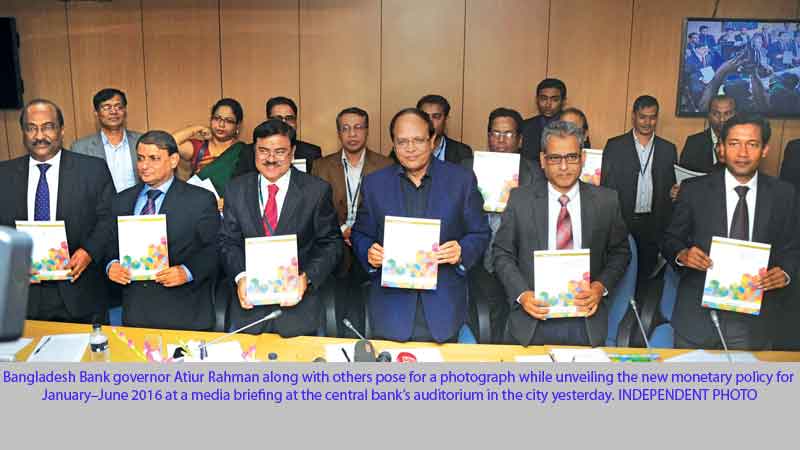Banking
FSIBL holds workshop on Investment Procedure
.jpg)
First Security Islami Bank Ltd organized 5 (Five) days Training workshop on Investment Procedure at First Security Islami Bank Training Institute on sunday.
Quazi Osman Ali, Additional Managing Director of the bank inaugurated the workshop.
Forty (40) officers of Dhaka City Branches participated in the training.
The workshop was presided over by Atiur Rahman, Principal, First Security Islami Bank Ltd. Training Institute.
Among others, Md. Zahurul Haque, EVP & Head , Md. Jahangir Mollah, VP, Investment Division and Muhammad Lutful Haque, VP and Faculty Member, FSIBL Training Institute were also present on the occasion.
News:Daily Sun/7-Feb-2016
“UCB, The Way Forward 2016” held

A business conference of United Commercial Bank Limited (UCB) titled “UCB, The Way Forward 2016” was held on 4 February 2016 at The Palace Resort, Habigonj.
The conference was presided over by the Managing Director of UCB Muhammed Ali.
Among others the Additional Managing Directors namely M. Shahidul Islam, Mirza Mahmud Rafiqur Rahman and A. E. Abdul Muhaimen; Deputy Managing Directors namely Md. Tariqul Azam, Mohammad Shawkat Jamil, Md. Sohrab Mustafa, Golam Awlia and Md. Abdul Jabber Chowdhury along with other senior officials, top 20 Branch Incumbents and Divisional Heads of UCB were also present at the conference.
Review of Bank’s existing strategic policy for catering to the future tactical work plan to expand the quality of client service and product diversity was the main issue of the conclave. Everyone participating at the conference ventilated their valuable opinion on the strategic planning of UCB.
Caption: Managing Director of UCB Muhammed Ali along with other Additional Managing Directors and Deputy Managing Directors of UCB at the Business Conference named “UCB, The Way Forward 2016”.
News:Daily Sun/8-Feb-2016HSBC to pay $601m for shoddy US mortgage practices
British banking giant HSBC is to pay more than $600 million to US authorities for its abusive mortgage lending and foreclosure practices in the housing market, officials said Friday.
HSBC will pay $470 million to settle the allegations by the US government, 49 states and the District of Columbia, the Justice Department said.
"This agreement is the result of a coordinated effort between federal and state partners to hold HSBC accountable for abusive mortgage practices," said Stuart Delery, acting associate attorney general, in a statement.
News:The Daily Star/8-Feb-2016
BB monetary policy to boost domestic demand
Central bank targets 7pc GDP growth
 The Bangladesh Bank (BB) announced the second half-yearly monetary policy, placing its main thrust on boosting domestic demand for achieving the government’s target of 7 per cent growth in gross domestic product (GDP).
The Bangladesh Bank (BB) announced the second half-yearly monetary policy, placing its main thrust on boosting domestic demand for achieving the government’s target of 7 per cent growth in gross domestic product (GDP).
“Our earlier engine was exports. Now, domestic demand has been added to it as a new engine for achieving the target,” said Bangladesh Bank governor Dr Atiur Rahman, while unveiling the new monetary policy for January–June 2016 at a media briefing at the central bank’s auditorium in the city yesterday.
“This is an investment-stimulating monetary policy, which will focus on quality credit expansion through an inclusive approach,” the bank said, adding, “Selective easing for agricultural and other productive sectors will draw enhanced attention.”
Rahman said recent economic indicators point towards a solid growth momentum in FY2016: exports are picking up despite the challenging external environment; capital machinery imports grew robustly in recent months; private sector credit growth rose to 13.7 per cent in November, up from 13.2 per cent during the last monetary policy in June, supplemented by strong private sector external borrowings.
“Interest rates have declined, with spreads now at less than 5 per cent,” the central bank’s governor said.
Banks are being encouraged to further bring down the spreads. Incorporating both the domestic and external developments, the BB has projected FY2016 growth at 6.8–6.9 per cent and inflation at 6.1 per cent in June 2016, Rahman said, adding: “With continued political stability, growth could reach 7 per cent.” “We need to upgrade our export performance through higher productivity, investment, and diversification. But that may not be enough. We can—and should—add another strong engine to our export-led growth model,” he said.
“That engine is our domestic demand, which, fortunately, can leverage our demographics, tech-savvy youth, market size, and population density. Our growth will then be even more robust, fuelled by two engines—exports and domestic demand,” he added.
“For these two engines, especially domestic demand, to function properly, the financial system has to play a critical role: ensuring that national savings rise and are then channelled into their most productive and equitable usage, not to the privileged bidders. It is not only higher, but also more productive investment that we are after. This will also require further deepening of our financial system,” he also said.
“The BB remains committed to serving the savers and the borrowers through better regulation, supervision, policy innovation, and market development,” he added.
“The BB places strong emphasis on improving governance and supervision to achieve higher financial intermediation efficiency. The recent BB appointments of bank observers reflects that priority,” the BB governor said.
“Our prudent monetary policy and regulatory support are designed to foster a sustainable development of capital markets. We are also working on issuing green bonds to nudge our financial system to serve our environment,” he added.
The new monetary policy is projected to grow at 15.0 per cent in June 2016 from 14.2 per cent in December 2015. The policy is adequate to support the growth and inflation targets. It has also taken the growth rates of both public and private credit into account.
Domestic credit is projected to grow at 15.5 per cent at the end of the fiscal year 2016 from 10.9 per cent in December 2015. Private sector credit is projected to grow at 14.8 per cent in June 2016 from 13.8 per cent in December 2015. Public sector credit is expected to grow at 18.7 per cent from a negative figure of 1.7 per cent in December 2015. The new policy also said inflation is expected to come down to 6.07 per cent in June 2016 from 6.20 per cent in December 2015. Some effects of pay rise in the government sector are likely to be cancelled out by the dampening fuel and commodity prices.
After keeping a static set of policy rates—repo and reverse repo rates—for a while, the Bangladesh Bank has now decided to lower the repo rate and reverse repo rate by 50 basis points, sending the repo to 6.75 per cent and reverse repo to 4.75 per cent from the current rates. This move will attempt to dampen other interest rates in the market and help stimulate investments. Market alignments that are necessary have warranted this change, the new policy explained.
The falling fuel and commodity prices have globally created a low-inflation environment, paving the way for a considerable reduction in policy rates, thereby signalling the market to raise investments when macro stability is commendable.
The BB has also made a strategic shift in its loan disbursement policy. All banks will be encouraged to substantially increase advances to micro, small, and medium enterprises. The BB's bank’s supervisory vigilance on banking governance will be further strengthened to clamp down on loan delinquencies.
The policy noted that as before, the BB's monetary and financial policy stance remains grounded in the mandate of developmental central banking, which is enshrined in its charter.
BB sets SME loan target of Tk1,13,503.43 cr
Economic Reporter :Bangladesh Bank has set the SME loan disbursement target for Tk1,13,503.43 crore through all the commercial banks in the current year 2016. The target is 8.53 per cent higher than the earlier target of Tk 1,04,586.89 crore for the year 2015.'We expected that the SME loan disbursement will be higher than that of the target set for the year 2015. We have increased the loan disbursement target for the SME sector as the banks focused their lending to this sector amid lack of demand for by industrial sector," said Swapan Kumar Roy, General Manager of SME and Special Programmes Department of Bangladesh Bank. He said this while addressing a press conference at the conference of Bangladesh Bank on Thursday. Though the overall credit growth remained in a slower pace, SME loan disbursement, however, witnessed an increased trend as banks were vigorously implementing their SME lending strategy, he explained.Executive Director of Bangladesh Bank Nirmal Chandra Bhakta was present on the occasion.
News:New Nation/5-Feb-2016


